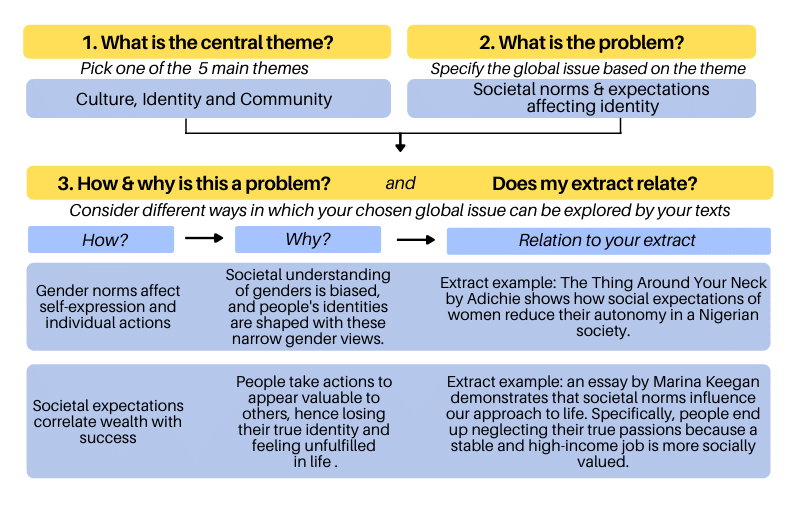In this guide, IB45 graduate Richard Nguyen and IB43 graduate Jerica Nieva will share their wisdom on how to tackle the IB English IO. The guide covers everything from choosing global issues toselecting a good extract to structuring the IO to preparing for the question section at the end!
Richard and Jerica both achieved 7s in IB English Language and Literature, with Richard scoring an almost perfect 38/40 for his IB English IO.
Meet your instructor Jackson Huang, Founder of LitLearn. His mission is to make IB English as pain-free as possible with fun, practical lessons. Jackson scored an IB45 and was accepted to Harvard, Amherst, Williams Colleges, and full scholarships to University of Melbourne & Queensland.

What is the IO?
First things first, what is the IB English Individual Oral?
- It's a 15 minute oral exam.
- The first section is a 10 minute presentation by you, the student, followed by a second section consisting of 5 minutes of questions asked by your teacher.
- The IO is centered around a Global Issue.
- For IB English Language and Literature, you must analyze a literary text and a non-literary body of work.
- For IB English Literature, you must analyze two literary works (one of them must be a work-in-translation).
- Comparison and contrast is not a requirement (unlike in Paper 2)
How do I choose a good Global Issue?
A strong house requires a stable foundation. And if you want to get a 7 for your Individual Oral, then you must have a strong global issue (GI).
The global issue should* belong to one of the following 5 themes:
- Culture, identity and community
- Beliefs, values and education
- Politics, power and justice
- Art, creativity and the imagination
- Science, technology and the environment
*Actually, that's a lie. According to the current IB English syllabus (First assessment 2021), your global issue doesn't need to belong to any of the suggested themes. The themes are simply suggested by the IB to help you with brainstorming.
First, an excellent Global Issue is one that is relevant to our current society. It must be relatable to many people across diverse cultures and national borders.
Global Issue Examples
To make it clear exactly what we mean, here is a weak global issue as an example…
| Chosen Theme | Politics, power and justice |
| Global Issue | “Increasingly unaffordable healthcare causing a health crisis in the US” |
| Why it's a bad global issue | Unaffordable healthcare is unique to America and a few other countries, so it's not the most global of issues. |
Now let's look at an example of a strong global issue…
| Chosen Theme | Culture, identity and community |
| Global Issue | “Social media leading to negative body image and self-esteem” |
| Why it's a stronger global issue | This is a better GI because it's a contemporary issue and is relatable globally across different cultures and countries. |
| What could be improved | This global issue is somewhat overdone. Try to be more unique when picking your global issue. |
If you're stuck on choosing a global issue, check out this detailed lesson on choosing your global issue. We also include 25 global issue starters to get your creative juices flowing.
Individual Oral
No sign up or credit card required.
How do I pick good extracts for my IB English IO?
Throughout IB English, you'll study various literary and non-literary texts in class that you may choose to use in your IB English IO. How you select your extracts can greatly impact your IO as they need to relate to your global issue.
Before selecting your extract, you should consider how well it can support your chosen global issue. To do this, consider breaking down your main topic into different explanations for how and why it is a global issue, and making these specific for each text.
Let's read about Richard's experience to see how he approached this process:
“I talked about societal expectations placed on women for one body of work (The Thing Around Your Nick by Chimamanda Ngozi Adichie), and how these expectations reduce their autonomy in Nigerian society.
For another body of work (this was a collection of essays by Marina Keegan my school put together), I discussed how several different norms affect human life: having a stable and high-income job rather than pursuing a risky passion, doing vain acts of charity such as saving whales rather than making a homeless man walk to a shelter. Everything links back to the global issue, that's how you remain focused.”
Richard Nguyen, IB45 graduate

You should also consider how the maximum number of lines that you can include in your extract for each text is 40 lines. This gives you some freedom in choosing how in-depth you want your analysis to be. Overall, you want your close analysis to be covering the whole extract – meaning that there is no point in choosing 40 lines and only analyzing the first 20 lines of it. You could lose marks for failing to demonstrate your full knowledge of the extract in Criteria A! So sometimes, less is more and choosing 20-25 lines is the better call.
Alternatively, you may find that analyzing a long extract is necessary for having enough evidence to support your global issue in a close analysis. Using up to 40 lines in this case would instead be a good approach! Having an effective close analysis will make more sense when we learn about structuring an IO in the next section.
Steps for selecting extracts:
- Read both texts and find a common global issue.
- Find different extracts within your texts that relate to the global issue.
- Compare the different extracts for each text, and pick the one that has a variety of literary and structural techniques that will best support your global issue. Remember these techniques must serve a purpose in portraying the author's intention and commentary on your global issue.
- Consider cutting down your number of lines if you are struggling to include everything in your analysis planning, or adding more lines if you find you need more evidence.
For Step 3, you must know how to find and analyse literary, visual and structural techniques. Analysis is one of the most difficult skills to master–and yet it is crucial to scoring highly on the IB English IO (and HLE, Paper 1, and Paper 2).
How should I structure my IB English IO?
Overall, an IO speech is 10 minutes long and covers an introduction, text analyses, and a conclusion. Afterwards, there is a 5-minute period in which your examiner will ask different questions – this may seem daunting, but we will guide you on how to prepare later on. It is very important that you are spending the correct time on each section of your speech as criteria C is about organization! Generally, you should aim to have 1 minute for your introduction and conclusion, and 4 minutes for each text analysis.

What do I say in my introduction?
Firstly, your introduction is vital in establishing your global issue and how you plan to explore it through your literary and non-literary texts. As it is only 1 minute, you want to ensure that the information you include is necessary and wholly contributes to your examiner's understanding of your IO.
- Introduce the global issue. Don't be vague in this section and spend around 2-3 sentences specifying how and why your global issue is relevant and multifaceted enough for an IO.
- Introduce your first text. Give only the most significant details such as the author's name, date, text type, and text source. You may also consider detailing the extract pages and whether your text is from a collection.
- Briefly explain (1-2 sentences will be sufficient!) how your first text relates to the global issue.
- Complete steps 2 and 3 for your second text. It would also be helpful when introducing your texts to specify which is literary and non-literary.
- Don't be tempted to include a comparison in your introduction! It works better in your conclusion if you wish to include it.
Secondly, how you structure your textual analyses can vary a lot depending on the number of ideas you aim to cover, and how you organize them to appear cohesive. Before planning your IO structure, you should thoroughly understand the difference between close analysis and wide analysis.
How do I analyze in IB English IO?
There are two different types analysis required in the Individual Oral: Close analysis and Wide analysis. It's important to pick an essay structure that balances the two types of analysis.
What is close analysis?
Close analysis is similar to how you would analyze for a Paper 1 – you reference specific quotes, images, or scenes from the extract when making your analysis and evaluations. Of course, we need to link to the Global Issue in the right way, and also find insight in these links. This is why choosing your extract lines is a critical process as you want to be demonstrating a full understanding of your extract.
Just like in Paper 1, we recommend that you learn how to analyze the 7 main techniques. There are a lot more, but these are a great starting point if you're unfamiliar with literary techniques and analysis.
Learn Analysis
No sign up or credit card required.
Learn Analysis
No sign up or credit card required.
Learn Analysis
No sign up or credit card required.
Learn Analysis
No sign up or credit card required.
Learn Analysis
Free signup required.
Learn Analysis
Free signup required.
Learn Analysis
Pro members only
Learn Analysis
Pro members only
How do I choose a balanced IO structure?
The Close and Wide analyses for both texts need to be balanced. There are two main structures that we recommend, which we delve into in the Pro lesson below.
How do I prepare for the IO Questions?
Not gonna lie–the questions can be curveballs.
While your response to these questions cannot make you lose any marks in an IO (which is a relief!), this section is still very crucial in securing those bonus marks to bring you up a grade.
Questions that are asked may be about:
- Ideas in your IO speech that could be explored in more detail (this is the most common source of questions!).
- Providing further examples from the text or extract on a certain topic or line of inquiry.
- Providing further explanation on the author's intention or audience effect of a specific literary technique that you mentioned.
While these questions are generally relevant to your global issue, they may not be. Ultimately, it is up to your examiner.
For example, your examiner may ask if there are other extracts that explore “how patriarchal values inhibit women in Nigeria”. And you'll have to answer if there is such an extract and do some light analysis on how this inhibition is caused. Does it inhibit opportunities? Or self-expression? Freedom?
Although your preparation for the IO questions is crucial, the timing of your responses can also influence your performance as you want to be making the most out of the 5-minute period. Here are some tips for during an IO:
- Spend around 1-1.5 minutes for each response – this allows you to answer up to 4-5 questions. While it might seem insightful to give a 4-minute-long answer, it also restricts the examiner from asking more questions which are generally about parts of your speech that needed a bit more support.
- If you are nearing 4.5 minutes, it is best to not finish your current response for a new question as you won't be able to give another response in 30 seconds.
Let's read Richard's wise words on how he prepared for his IB English IO questions:
“The best advice I can give you is to know your texts inside out. After each section or chapter from a body of work, write notes about what is explored regarding your global issue. This way, you'll be actively thinking about how the global issue is depicted through your texts. Think: 'what does this section tell me about the global issue?'
You should also prepare other examples that prove your point in your analysis. When writing about how the author portrays the global issue through a scene, know if a similar scene pops up in your body of work where the global issue is portrayed in the same way or another one.
Essentially, read the entire bodies or work and have a general idea of how the global issue seeps through the entirety of the texts.”
Richard Nguyen, IB45 graduate
More lessons in the IO Study Guide
We can't cover everything in this introductory guide.
LitLearn's Pro lessons take you step-by-step through choosing your global issue, planning your IO and choosing the right structure.
We also show you how to approach the IO with the right mindset to avoid costly mistakes, and detailed worked examples to show concrete strategies to score a 7 in your analysis and IO insights.
Individual Oral
Pro members only
Individual Oral
Pro members only
Individual Oral
Pro members only
Individual Oral
Pro members only
Wrapping up
We hope this guide has helped you navigate one of the most important (and stressful!) parts of your IB English assessment. Thanks to Jerica and Richard for collaborating on this guide to help fellow IB English students out there.

